April 25, 2025
Air Date: April 25, 2025
FULL SHOW
SEGMENTS
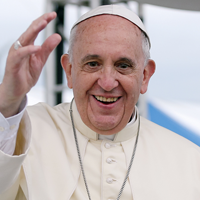
Pope Francis and the Climate: Laudato Si'
View the page for this story
As the world remembers the legacy of Pope Francis we return to his groundbreaking 2015 encyclical, “Laudato Si’: On Care for Our Common Home.” It's a poetic, emotional call for a fundamental shift in our economic system, and a rethinking of our relationship with God's creation: the natural world. Assistant Professor of Theology, Science and Ethics at Fordham University, Christiana Zenner, discussed with Host Steve Curwood the Pope's powerful message. (12:39)
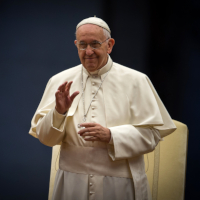
Pope Francis and the Climate: Laudate Deum
View the page for this story
In 2023 Pope Francis published an even bolder update to Laudato Si’, his climate change encyclical. Christiana Zenner of Fordham University joined Host Paloma Beltran to discuss how “Laudate Deum” takes on climate denial and urges the world to act swiftly to avert climate disaster. (12:34)
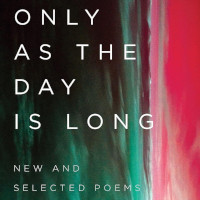
"Evening" Poem by Dorianne Laux
View the page for this story
As Poetry Month ends, we turn to poet Dorianne Laux, whose latest collection is titled Life on Earth. Her poem “Evening” from a few years ago simultaneously expresses her grief at her recent loss of her mother and the waning of the whole biosphere in the face of climate disruption. Dorianne Laux joined Living on Earth’s Jenni Doering to read her poem and talk about finding solace in nature. (07:16)
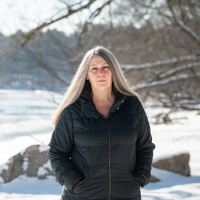
Fighting PFAS
View the page for this story
Laurene Allen moved to Merrimack, New Hampshire to raise a family in the 1980s. Little did she know that, in 2016, the state would reveal that her town’s water supply was contaminated with high levels of PFAS, or forever chemicals, leaked by a nearby plastics plant. Laurene organized a grassroots campaign to expose widespread health harms in her community linked to those chemicals, and the plant eventually shut down. She has been recognized with the 2025 Goldman Prize for North America. Laurene Allen joins Host Steve Curwood to share her story. (14:43)
Show Credits and Funders
Show Transcript
250425 Transcript
HOSTS: Paloma Beltran, Steve Curwood
GUESTS: Laurene Allen, Dorianne Laux, Christiana Peppard, Christiana Zenner
[THEME]
CURWOOD: From PRX – this is Living On Earth.
[THEME]
CURWOOD: I’m Steve Curwood.
BELTRAN: And I’m Paloma Beltran.
Remembering Pope Francis and his message to the world.
FRANCIS: Climate change is a problem which can no longer be left to a future generation. When it comes to the care of our “common home”, we are living at a critical moment of history.
CURWOOD: Also, how a social worker won a fight against toxic forever chemicals.
ALLEN: I realized quickly that people in an impacted community such as this are speaking from emotion. They're speaking their truth; And that isn't enough to sway the system. And I said, Hmm, we need to become our own experts. We need to learn how to talk at a high level, so people realize we know what we're talking about.
CURWOOD: That and more, this week on Living on Earth. Stick around!
[NEWSBREAK MUSIC: Boards Of Canada “Zoetrope” from “In A Beautiful Place Out In The Country” (Warp Records 2000)]
[THEME]
Pope Francis and the Climate: Laudato Si'
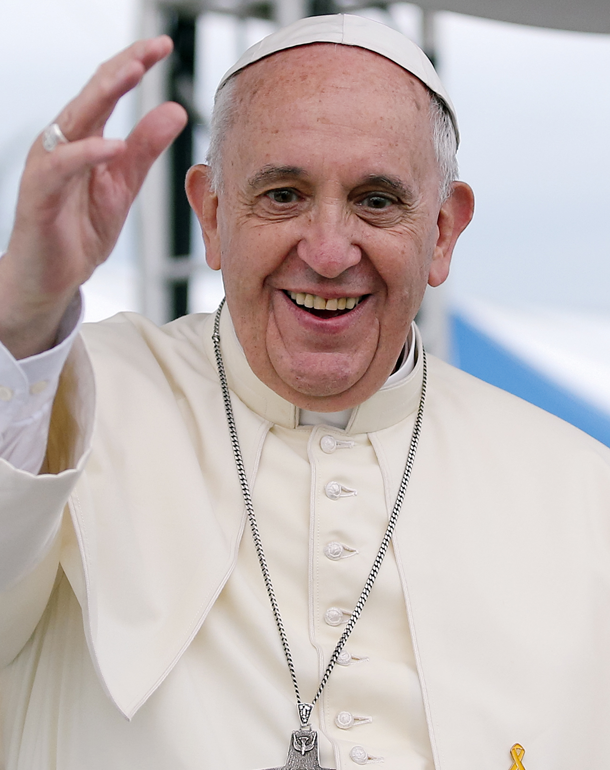
Pope Francis was a chemical technician in Argentina before joining the seminary. (Photo: Korean Culture and Information Service, CC BY-SA 2.0)
CURWOOD: From PRX and the Jennifer and Ted Stanley Studios at the University of Massachusetts Boston, this is Living on Earth. I’m Steve Curwood.
BELTRAN: And I’m Paloma Beltran.
On Easter Monday and the eve of Earth Day the world lost a champion of the environment and social justice. Pope Francis had chosen his name to pay homage to St. Francis of Assisi, the patron saint of animals and the environment. This first Jesuit Pope led the Catholic Church during more than a decade of worsening environmental disruption.
CURWOOD: Pope Francis recognized the climate crisis as a spiritual crisis and called upon all of humanity to address it. In September of 2015 he visited Washington, D.C. and gave a speech at the White House alongside President Obama.
POPE FRANCIS: Climate change is a problem which can no longer be left to a future generation. When it comes to the care of our “common home”, we are living at a critical moment of history. We still have time to make the changes needed to bring about “a sustainable and integral development, for we know that things can change.”
CURWOOD: During those remarks Pope Francis drew on his landmark encyclical Laudato Si’: On Care for our Common Home, published in May 2015. Around that time Fordham University professor of theology, science and ethics, Christiana Zenner joined us to explain the document and its importance, and here’s our conversation.
ZENNER: An encyclical is an authoritative teaching document issued by a pope that addresses issues of faith and morality, generally having to do with issues that are coming up in contemporary life. To the question of how important encyclicals are, they're really, really important. They're among the most authoritative teachings that the Catholic church has. And they're meant to be guidelines: sets of moral guidelines, frameworks, paradigms, reference documents to guide Catholics and Bishops and people of goodwill in thinking about matters of common concern.
CURWOOD: The headlines on this encyclical have focused on the warming climate and the Pope's call for the phaseout of fossil fuels, but before we get to some specifics, let's talk about the Pope's overall approach here. This encyclical opens by calling for a new and universal solidarity among humans. What's he talking about?
ZENNER: Right. That's a vast idea that sounds like it might have something to do with the climate, and it does. But you're absolutely right that it's not just a climate encyclical. This is, as I see it, a real salvo from the Pope to all of humanity asking for universal solidarity on issues of common concern and especially on the question of the Earth, — or, in theological language, creation. He leads with the fact that the planet is falling into a state of disrepair, people are deeply mired in poverty, and this represents a failure of human responsibility. So his invitation is to a renewed, transformative form of responsibility and global solidarity with one another, involving care for the Earth as our common home. So that’s part of why the document is subtitled, "On the care of our common home."
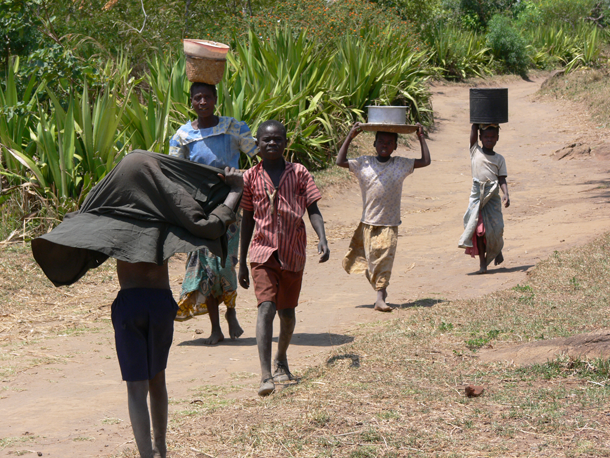
Children hauling water in Malawi. Pope Francis points to global inaccessibility and inequity of environmental resources as a problem, and the burden of this consumption issue often falls on those least responsible for it. (Lars Plougmann, CC BY-SA 2.0)
CURWOOD: Now, what kind of relationship is the Pope calling for humans to have with nature, what he calls creation?
ZENNER: Yeah, you know, this document is really fascinating because it draws on established Catholic social teaching on the environment, some ideas that really got going with Pope John Paul II and Pope Benedict XVI. But at the heart of this document is relationships. So I would say that far more than being a policy white paper or a political précis on how various international negotiations ought to proceed, it's a document on ethics, it's a document of moral vision. And it's calling for a kind of transformation in the way we regard our relationships: between humans and God, humans and each other, and humans and the planet. And the Pope's diagnosis is that there are real spiritual malaises, as well as structural impediments, to the right functioning of those relationships at present. The Pope says the church has interpreted humans as having dominion over the planet, and that dominion has too often been lived out as domination. Christians and Church history who have done this are wrong. We need to get back to a better and more accurate interpretation, and here's what that would look like.
CURWOOD: So, in this, he seems very concerned about environmental refugees. What do you think motivated that?
ZENNER: I think the Pope sees a lot of the dynamics of environmental degradation globally as driven by economic structures of profit, and a focus on economic development and growth that is not accountable to the limitations of what the planet can absorb. And it is not accountable to the burdens that are carried by people living in poverty. So, as a Pope who comes from South America, who spent time in slums, who has written extensively about the lives of the poor and problems of neocolonialism, and who has had critiques, frankly, of what he has called the deified market, making the market into something like an idol or God — he’s very concerned with the fact that people no longer have homes, literally and metaphorically. So environmental refugees, you know that's a huge problem for people displaced by, say, large dams or rapid desertification. But it's also a spiritual problem in, as he writes, "everyone needs a home and is entitled to a home."
CURWOOD: Let's talk about his economics. How radical is his vision? It sounds like he's calling for a revolution in this document.
ZENNER: You know, I think he is. I think he is calling for a revolution. Now it's never going to be a violent revolution, it's never going to be reducible to endorsing a particular form of political economy. But what he's saying is so much in line with what folks like Gus Speth and others thinking about the new economy have been talking about. And that is simply that there need to be moral limits on economic quote on quote progress. So he writes about how in an era where human creativity has issued forth in robust kinds of technological advances and the creation of amazing wealth. The fact of the matter is that inequalities persist. And he has a great quote in the document where he says that the environment is deteriorating, and we still have not solved the problem of poverty. And he goes on to explain how our moral capabilities and our powers of reflection and action have not caught up with the powers of our technology and our economic systems. And that is to the detriment of all of us, especially the planet and the poor.
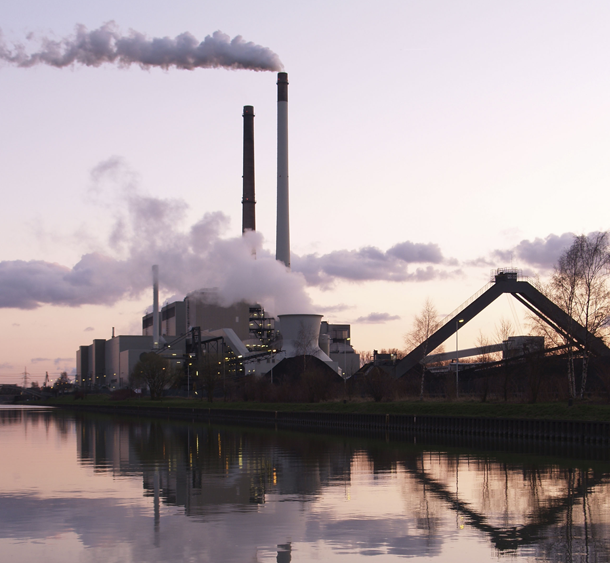
A coal power plant in Germany. The Pope says that consumption of non-renewable resources is destroying our common home. (Photo: Arnold Paul, CC BY-SA 3.0)
CURWOOD: Now, specifically on the climate, he says, look, humans are responsible for most of what's going on, and in terms of the international negotiations, he calls for us to deal with them with “common and differentiated responsibilities.” What does he want? What's he talking about?
ZENNER: Well, the language of "common and differentiated responsibilities" is one that you see in diplomacy and in the history of negotiations over international climate treaties. So, I think that the Pope has a significant, powerful audience in mind for this encyclical. Yes, it's directed to everyone on the planet, but there are a lot of passages that are directed towards super developed nations, such as our own. And what he says here is that while there have been some successful international treaties in the past, there have also been some real failures — the Kyoto Protocol, for example, and even more recent climate negotiations. And he is extremely and really quite exquisitely clear that the burdens have been caused by certain industrial actors — we are central among them — and the responsibility for them must be taken on primarily by those countries which have benefited the most. So he uses the language here of an ecological and social debt that highly developed nations owe to less developed nations. And this is really powerful language. He even goes so far as to say, in terms of particular options, that he's unconvinced that carbon pricing or cap-and-trade would do anything more than simply be a bandage, that doesn't amount to the radical change that is required by the situation. And that's his phrase, the radical change that is necessary.
CURWOOD: Yeah, looking at that section where he has his strategy of buying and then selling carbon credits can lead to a new form of speculation, and it goes onto say it may simply become a ploy which permits maintaining the excessive consumption of some countries and sectors.
ZENNER: Exactly.
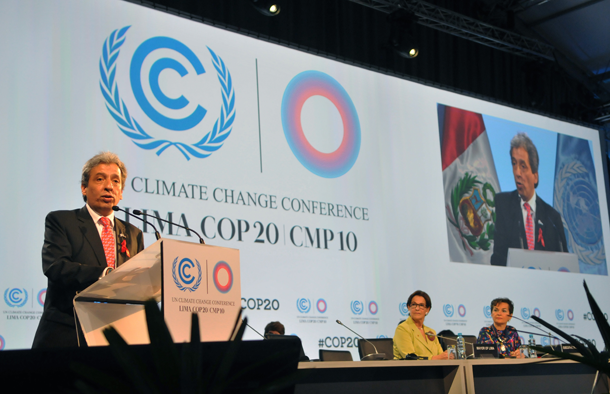
In chapter five of the encyclical, Pope Francis discusses the environment and our responsibility as an international community to it and each other. More and more, climate talks and negotiations like the 1992 Earth Summit and 2014’s COP20 set out to cooperate to reduce global pollution and fix social injustices but ultimately fall flat due to inaction and non-compliance. (Photo: Elekhh, Wikimedia CC BY-SA 2.0)
CURWOOD: Now, consumption is the problem from his perspective in this — not population — and he talks about, let me quote him here, “this paradigm over consumption that leads people to believe that they are free as long as they have the supposed freedom to consume.” What does he mean?
ZENNER: What the Pope is saying in this document is that the idea of human freedom as amounting to what we can buy, or what we can consume, that gives us momentary utility or pleasure — he thinks that is an impoverished form of freedom. He talks about the need for an authentic human freedom that means, for example, that all people have basically livable standards of life, including, he talks about in paragraph 30 — one of my particular interests — the right to clean water, and various other fundamental issues that undergird the right to a life with dignity. Obviously population politics, reproduction, and the Catholic Church — that’s a big topic, and the Pope doesn’t really get into the reproductive aspects, or sexual ethics or any of that. What he says — and frankly, I think he’s right, at least on this part — is that we can’t merely think about the environmental crisis as a problem of sheer numbers. That’s just flat footed. Yes, people impact the planet, so, logically, it would make sense that more people would impact the planet more. But he rightly points out that there are certain sectors of humanity, I’m among them, you’re among them, the listeners on this show are among them, who consume so much more than our fair share, that we really need to take a look at our own mentalities of consumption and the spiritual malaise that accompanies them. As a professor and as someone who has been very struck by the powerful analyses in this document, my hope is actually that people sit down with it and read it. Even if it’s bit by bit, or little by little, all 246 paragraphs — not with the idea that it needs to be analyzed and that it provides a specific road map of who to vote for; it doesn’t. But to read it as a document of contemplation, and to try to see with the eyes of poetry and beauty and ethics what the pope might be asking of us, and what various ways of living that out might be. Not everyone’s going to agree with everything in there, but the document really is an invitation and a set of principles for moral reflection.
CURWOOD: That’s Christiana Zenner of Fordham University. We spoke in 2015 when Pope Francis published his groundbreaking encyclical on the environment and climate, Laudato Si’: On Care for Our Common Home. We’ll be back after the break to talk about its even bolder sequel as we continue marking his legacy. Stay tuned to Living on Earth.
Related links:
- Pope Francis’s “Laudato Si” Encyclical Letter
- Statement by President Barack Obama on Pope Francis’s Encyclical
- Christiana Zenner (Peppard's) chapter by chapter summary and analysis of the encyclical
- “On Planet in Distress, a Papal Call to Action”
- Anticipation of Pope Francis’s encyclical
- About Christiana Zenner
[MUSIC: Hector Berlioz' "Grande Messe des Morts" (Requiem for Tenor, Mixed Choir and Orchestra op. 5), performed by the WDR Radio Choir, WDR Symphony Orchestra, Czech Philharmonic Choir Brno and Tenor Andrew Staples under the baton of conductor Jukka-Pekka Saraste. Recorded live on 18 May 2017 in Cologne Cathedral]
ANNOUNCER: Support for Living on Earth comes from Sailors for the Sea and Oceana. Helping boaters race clean, sail green and protect the seas they love. More information @sailorsforthesea.org.
[CUTAWAY MUSIC: Hector Berlioz' "Grande Messe des Morts" (Requiem for Tenor, Mixed Choir and Orchestra op. 5), performed by the WDR Radio Choir, WDR Symphony Orchestra, Czech Philharmonic Choir Brno and Tenor Andrew Staples under the baton of conductor Jukka-Pekka Saraste. Recorded live on 18 May 2017 in Cologne Cathedral]
Pope Francis and the Climate: Laudate Deum
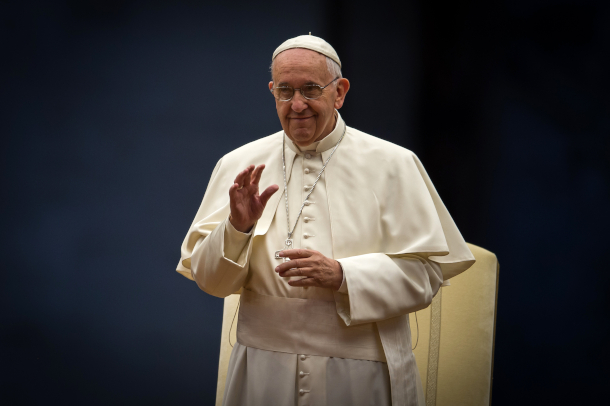
Pope Francis wrote his first papal document on the environment, Laudato Si’, in 2015. (Photo: Catholic Church England and Wales, Flickr, CC BY-NC-ND 2.0)
CURWOOD: It’s Living on Earth, I’m Steve Curwood.
BELTRAN: And I’m Paloma Beltran.
We’re continuing our coverage of the impact the late Pope Francis had on the environment and climate movements. Before the break we heard about his seminal 2015 encyclical, Laudato Si’: On Care for our Common Home. A few months after Laudato Si’ was published, the world’s nations adopted the Paris Agreement. A watershed moment for global action on climate though the Trump administration is once again withdrawing the United States from Paris. In 2023 Pope Francis came out with an even more daring sequel, Laudate Deum or “praise God for all his creatures”. And Fordham University professor Christiana Zenner joined us again to shed light on the Pope’s even more urgent call for climate action.
ZENNER: This document is a total zinger compared to Laudato Si'. So whereas Laudato Si' in 2015, was extensive, it was quite long, it was measured and pastoral and expressive and philosophical. This document, Laudate Deum, is much shorter. And it is super focused on the realities of climate crises, the realism of climate change, anthropogenic climate change in particular, as a moral, ecological social problem, and on the responsibility of all people to take up action in order to address these problems. So there's a lot of really specific citation of science, there is a lot of very specific invocation about the kinds of things that need to happen. And then there is a little bit of philosophical and theological framing. But it's a really punchy document. And in some points, it's actually even a little bit snarky. He's saying to very high consuming nations, and specifically the US, he calls out the US explicitly in the penultimate paragraph of the exhortation. He says the rates of consumption are so far above China, and even more profoundly above peoples and nations that are far less developed. And so he's really taking language that is similar to the Kyoto Protocol and other kinds of agreements that see consumption by particular nations as historically problematic and in an ongoing way. It's also I think, taking pretty specific aim at the US Conference of Catholic Bishops and climate denialists. As you may know, the US Conference of Catholic Bishops has been pretty focused on pelvic issues, on abortion and contraception, etc, as its primary moral focus. And I think that it's no accident that the Pope uses a US Bishop's document from 2019 on climate change as the first citation, and then ends the document with this throwdown about US consumption. I think that's a pretty substantial frame.
"Praise God!" Pope Francis releases "Laudate Deum", his new Apostolic Exhortation on climate change and care for our common home. pic.twitter.com/G0h16nOsWH
— Vatican News (@VaticanNews) October 4, 2023
Above: Vatican News video promoting Laudate Deum.
BELTRAN: It seems like Pope Francis is not beating around the bush when it comes to climate change.
ZENNER: Oh, he is not. This is a throwdown document. It's really a zinger. So he's also then, especially in the first part of the apostolic exhortation, talking about climate denialism. And just taking it down, point by point. He just says, no, this doesn't hold, this is not tenable. This is not a Catholic point of view, it's not even a reasonable point of view. And let me show you why. And so in a very effective way, he just critiques those arguments. So for example, he says that in recent years, some have chosen to deride these facts, he's speaking of climate change. Then he says, they'll bring up the allegedly solid scientific data, like the fact that the planet has always had and will have periods of cooling and warming. But then he goes on to say, they forget to mention another relevant datum, that what we are presently experiencing is an unusual acceleration of warming at such a speed that it will take only one generation in order to verify it. And he does this a number of times, this language that is basically some claim, or some deride these facts, and they'll present this kind of claim, but they forget to include this other additional claim. And so in a way that is rhetorically powerful and philosophically grounded, he's calling those folks to task and saying your philosophy is bad and your science is too. Get with it.
BELTRAN: So what does this document say about the connection between the Catholic Church and the scientific world?
ZENNER: One of the things that's really interesting, and in many respects great about the Catholic Church is that in the late 20th century especially, it has had a pretty robust engagement with contemporary sciences of the time. And this document continues that trend. So if you look at the citations, like scholars love to do, if you follow the footnotes, there are tons of citations of the Intergovernmental Panel on Climate Change, these kinds of consensus documents that indicate the patterns, extent, and implications of anthropogenic climate changes. And so not only are those in the footnotes supporting a range of claims, there's also explicit numbers throughout the document. So I would say there's a huge relationship between the Catholic Church and science in this document. Because a lot of people think, oh, Catholic Church. Science. Well, Galileo, that didn't go well. But when we delve into it, you know, absolutely, yes, lots of problems going on in that era for sure. But there are also always really interesting moments that religious institutions, in this case, the Catholic Church, can assess developments in science and either hunker down and refuse to engage the questions raised, or say, wow, this looks like a big issue. What does this mean for theology, for morality, and for the project of being human? And that's what the Pope has chosen to do.
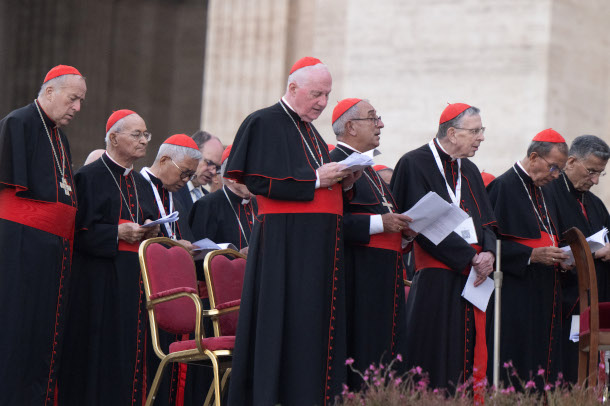
The Pope’s exhortation was published at the open of October 2023’s Synod of Bishops in the Vatican. (Photo: Catholic Church England and Wales, Flickr, CC BY-NC-ND 2.0)
BELTRAN: Christiana, what surprised you the most about Laudate Deum?
ZENNER: What surprised me the most? Well, I think there are a few things. One is how pithy and direct it is. The Pope knows what he's doing in this. And the structure of the apostolic exhortation, as well as the tone is remarkably direct, very readable, and, in many ways, at least from an interdisciplinary ethics perspective, irrefutable on the dynamics of climate change, and the science behind it, economic growth presumptions and the dynamics of consumerism, and what Pope Francis calls in a slightly more philosophical and theological way, the technocratic paradigm, which is a fetishization of economic efficiency and technological innovation. The presumption that those alone will solve ecological or social problems. So I was really, frankly stunned and really happy to see someone who is in a position of authority, yes, in a hierarchical patriarchal context that has massive problems. But as we saw in the reception of the 2015 Laudato Si' document, he's in a position to get people's attention. Another set of things that surprised me and didn't. There's one citation in there, citation 41, of feminist philosopher of science, Donna Haraway. She's an American, a long standing professor at the University of California Santa Cruz, someone who's been very critical of normative gender hierarchies as they play out in the practice and conceptualization of science, and a real advocate for multi-species relations. So she shows up in footnote 41, which is shocking, because she's on record as being anti-Catholic, anti-institutionally-Catholic, and anti-theistic in that sense. So, how on earth did this citation get into the apostolic exhortation? And what does it mean? I am fascinated and a number of us are trying to dig into this.
BELTRAN: So Pope Francis cited Donna Haraway, what did he say there?
ZENNER: So she is cited in a section on anthropocentrism. The idea that humans are at the center functionally, as well as morally, of the earth and of theological significance. And so Pope Francis says, the technocratic paradigm, which he had earlier critiqued, can deceive us by making us forget that the entire world is a contact zone. And he cites this book by Donna Haraway, called When Species Meet. And then the section goes on to talk about well, we can't have like a full anthropocentrism where humans are the only or exclusive focus, we need a situated anthropocentrism that recognizes the interrelations and the limits to human centrality and power. It is completely fascinating that the Pope chooses to cite her or the Pope's ghost writers, don't know which one. But it's kind of a two part thing. There's that whole reaction of oh my gosh, what on earth? And then the second part is, isn't it interesting, that of all the women to cite, all of the experts who happen to be women, the one he cites is Donna Haraway. And not the many, many, many women within the Catholic Church. Celia Deane-Drummond, Brazilian ecofeminist liberation theologian Ivone Gebara, there are so many brilliant scholars who are women who have been working with eco-theologies and orders of nuns who have been implementing ideas like this that far preceded even Laudato Si' in 2015. So the citation of Haraway is doubly bizarre. Because why not cite women who are also engaging the work of the church? And one skeptical answer is, well, there's a long history of excluding them. And maybe it would mean that their critiques would have to be taken seriously. I don't know. But it's one viable hypothesis.
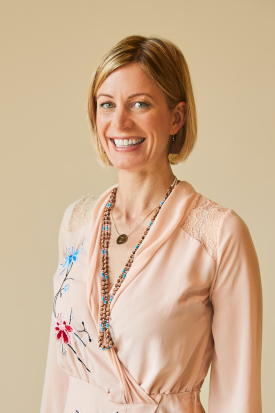
Christiana Zenner is an associate professor at Fordham University’s department of theology. (Photo: Courtesy of Christiana Zenner)
BELTRAN: That was an excerpt from our 2023 conversation with Christiana Zenner, associate professor of theology, science and ethics at Fordham University. It only seems fitting to close our remembrance of Pope Francis with a few more words from the man himself. The day after his 2015 visit to the White House, Pope Francis addressed a joint session of Congress, the first Pope to do so. It was a time of divided government, when Republicans controlled the House and Senate during the waning months of Democrat Barack Obama’s Presidency. The Pope called for unity and leadership from the US to address the climate crisis.
POPE FRANCIS: "In Laudato Si’, I call for a courageous and responsible effort to “redirect our steps” (ibid., 61), and to avert the most serious effects of the environmental deterioration caused by human activity. I am convinced that we can make a difference – I’m sure.”
BELTRAN: The late Pope Francis, speaking to congress in 2015. Pope Francis may be gone from this world but his writings on climate and environment endure. You can find links to Laudato Si’ and Laudate Deum on the Living on Earth website, loe dot org.
Related links:
- Pope Francis’ “Laudate Deum” apostolic exhortation
- Listen to our interview with Christiana Zenner on Laudato Si’ in 2015
- About Christiana Zenner
[MUSIC: Hector Berlioz' "Grande Messe des Morts" (Requiem for Tenor, Mixed Choir and Orchestra op. 5), performed by the WDR Radio Choir, WDR Symphony Orchestra, Czech Philharmonic Choir Brno and Tenor Andrew Staples under the baton of conductor Jukka-Pekka Saraste. Recorded live on 18 May 2017 in Cologne Cathedral]
"Evening" Poem by Dorianne Laux
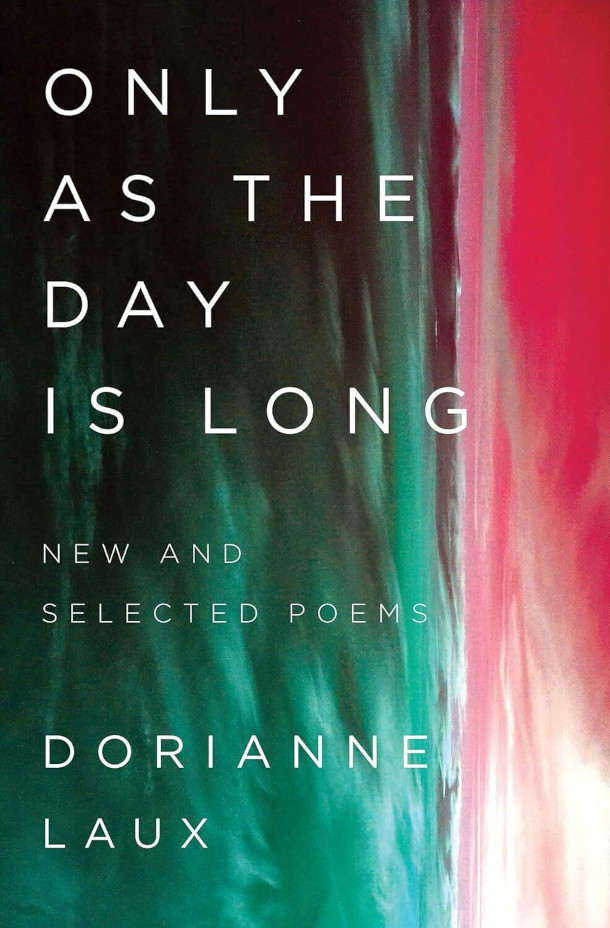
Dorianne Laux’s sixth poetry collection, Only As the Day is Long: New and Selected Poems was named a finalist for the 2020 Pulitzer Prize for Poetry. (Photo: W.W. Norton & Company)
CURWOOD: Life on earth was a key theme of the ministry of Pope Francis, and as poetry month ends, we turn now to poet Dorianne Laux, whose latest collection is titled life on earth. She has a poem from a few years ago that simultaneously expresses her grief at her recent loss of her mother and the waning of the whole biosphere in the face of climate disruption. In some ways it is not so different from the prayers and warnings offered by the late Pope. Her open verse is titled “Evening,” and she joined Living on Earth’s Jenni Doering to read and discuss this poem.
LAUX: "Evening."
Moonlight pours down
without mercy, no matter
how many have perished
beneath the trees.
The river rolls on.
There will always be
silence, no matter
how long someone
has wept against
the side of a house,
bare forearms pressed
to the shingles.
Everything ends.
Even pain, even sorrow.
The swans drift on.
Reeds bear the weight
of their feathery heads.
Pebbles grow smaller,
smoother beneath night’s
rough currents. We walk
long distances, carting
our bags, our packages.
Burdens or gifts.
We know the land
is disappearing beneath
the sea, islands swallowed
like prehistoric fish.
We know we are doomed,
done for, damned, and still
the light reaches us, falls
on our shoulders even now,
even here where the moon is
hidden from us, even though
the stars are so far away.
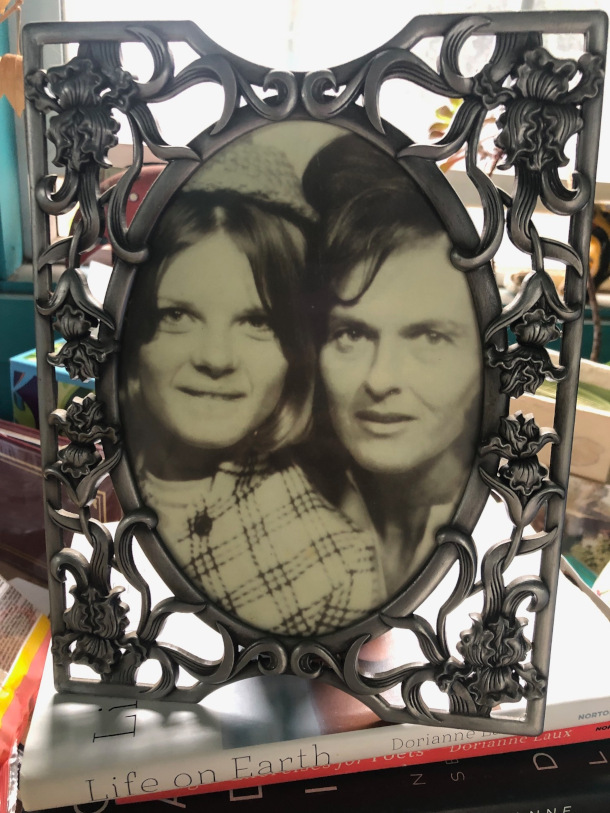
Dorianne Laux (left) and her mother, Frances (right). (Photo: Dorianne Laux)
DOERING: I just love this idea of moonlight pouring down without mercy. I don't normally think of moonlight that way.
LAUX: Well, I've done the forbidden, which is used the cliche of the moon, over and over again.
DOERING: What is it about the moon that calls you specifically?
LAUX: You know, I'm not really sure, but they appear in every single book I've written, and the stars are often apparent. There's something about looking up at the night sky. I grew up in San Diego, where the sky was pretty clear and we had a lot of good weather, and so the moon was just always there. And of course, you can't help but think of the mother and the poem this book comes out of is about, it's included in 20 poems about my mother after she had died. But it also is like, born of the earth and yet now desolate and barren. So I think that's what put me in mind of the earth, that it could become like the moon if we don't take care of her. So I think it was my mother and the moon and the idea of the earth as being the mother.
DOERING: And how much of you is in this poem, Dorianne?
LAUX: Well, I mean, probably underneath it a lot, you know. The silence is probably the silence of my mother. She's died. I'll no longer hear her voice. But it's also the possible silence of the planet, when Mother Earth is gone, you know, when we've extinguished it, and that everything ends, even pain, even sorrow, which you can't imagine. And you also can't imagine the earth ending, and if anything, it would be a horrible pain and sorrow. So I think I'm just conflating a lot of things in my mind, and I had no idea it was going to go into the land disappearing, maybe feelings about my mother that were inchoate that I hadn't really thought too much about. But then I think I made this connection between mother and Mother Earth and how the earth could become as desolate as the moon.
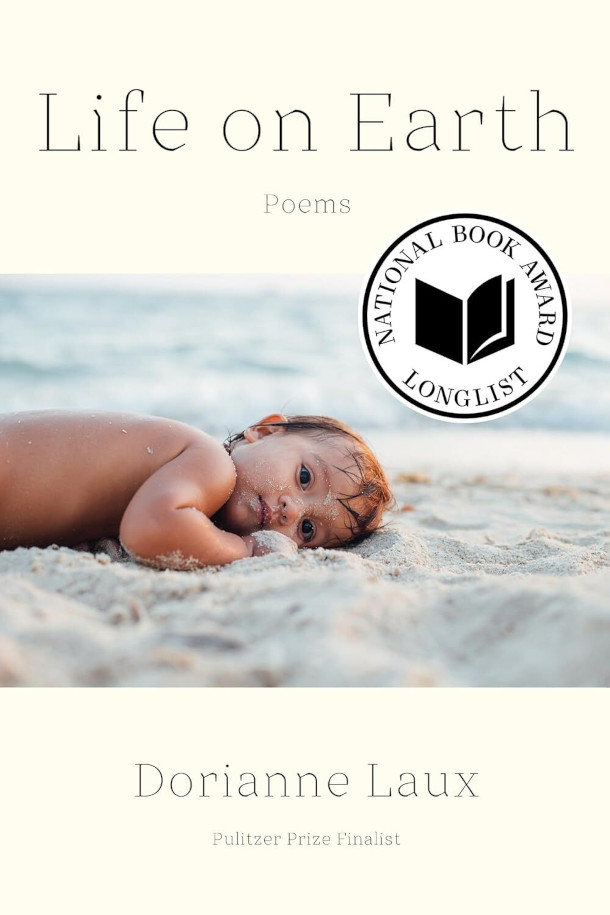
Dorianne’s latest poetry collection is called Life on Earth. (Photo: W.W. Norton & Company)
DOERING: It sounds like there's a lot of complicated emotions going on in this poem, and feelings like you're toying with hope, and hope is breaking through, even though you sometimes maybe don't want it to, but at the same time, there's this reality, you know, of things that are happening. You know, to what extent do you draw hope from the natural world?
LAUX: Oh, you know, I grew up in San Diego, and behind us was a canyon. And we explored that canyon, you know, day and night. It was part of a chain that went all the way down and into Mexico. And you could walk long distances through that canyon. And that's where I discovered horny toads and lizards and snakes and Manzanita, and it's red branches, blood red branches. And we spent many hours. And then also we were near the Pacific Ocean, and so we were there every day in the summer, swimming in the ocean, crawling in the sand, and there was just a lot of natural beauty around, and we communed with it. And I just grew up with this sense of the vastness of the earth, from the universe, which was above us to the ocean, where there were all these depths beneath us, that both were mysteries. And so I've always sort of had a sense of the earth as a part of the universe, but also us being part of a deep mystery, the ocean.
DOERING: Absolutely. And I want to ask you another question about, you lost your mother and ended up writing a series of poems after that. Is there an experience that you had turning to the natural world for solace, a particular place or a memory that you can share about trying to grieve and process your mother's loss?
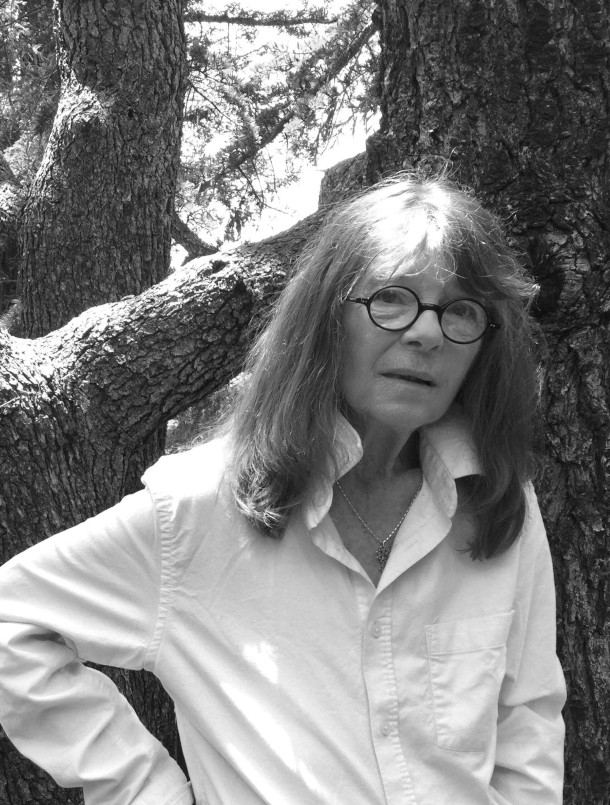
Dorianne Laux is a poet and Pulitzer Prize finalist. She grew up in San Diego. (Photo: Kim Addonizio)
LAUX: Yeah, I actually was teaching a workshop in Provincetown, so way over on the other side of the coast from where I grew up, but there was still the ocean, of course. So I went out, my sister called me, you know, late at night, and then after I was done talking to her, I went out onto the balcony, we were in a little two story apartment, and looked out toward the ocean, and just thought about my mother, you know, gone into that vast place and into the sky, which I loved. You know, but she was out there, in some form or other. I always, I think of her as being part of what I breathe. You know, I mean, she's in the air around me.
[MUSIC: Matt Stewart-Evans, “Waltz for Dreamers” on Wander (EP), 1631 Recordings]
CURWOOD: That’s poet Dorianne Laux (“Lox”) speaking with Living on Earth’s Jenni Doering. Her poem “Evening” appeared in the collection Only As the Day Is Long, a Pulitzer prize finalist. Dorianne Laux’s most recent collection, Life on Earth, was longlisted for the 2024 National Book Award for Poetry.
Related links:
- Read Dorianne Laux’s poem, “Evening”
- Read more about Dorianne Laux
- W.W. Norton & Company | Only As the Day Is Long by Dorianne Laux
- W.W. Norton & Company | Life on Earth by Dorianne Laux
[MUSIC: Matt Stewart-Evans, “Waltz for Dreamers” on Wander (EP), 1631 Recordings]
BELTRAN: Coming up, The North American recipient of the 2025 Goldman Environmental Prize was repeatedly told there was nothing to worry about when it came to PFAS “forever chemicals” in her community. But she did not back down, and her persistence paid off. Keep listening to Living on Earth!
ANNOUNCER: Support for Living on Earth comes from Friends of Smeagull the Seagull and Smeagull’s Guide to Wildlife. It’s all about the wildlife right next door to you! That’s Smeagull, S - M - E - A - G - U - L - L, SmeagullGuide.org.
[CUTAWAY MUSIC: Astor Piazolla, “Milonga Del Angel” on Tango: Zero Hour, Warner Records Inc.]
Fighting PFAS
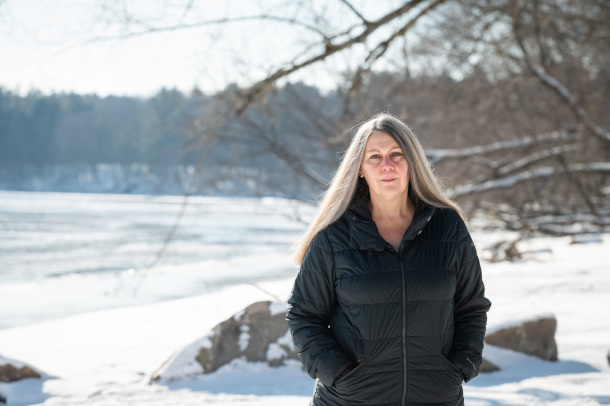
Laurene Allen is the 2025 Goldman Environmental Prize winner for North America. She lives in Merrimack, New Hampshire. (Photo: Goldman Environmental Prize)
BELTRAN: It’s Living on Earth, I’m Paloma Beltran.
CURWOOD: And I’m Steve Curwood. Laurene Allen moved to Merrimack, New Hampshire to raise a family in the 1980s. Little did she know that, in 2016, the state Department of Environmental Services would reveal that the town’s water supply was contaminated with high levels of PFAS, or forever chemicals, leaked by the nearby Saint Gobain Performance Plastics Plant. A social worker by training, Laurene became a self-taught expert in PFAS compounds and led a grassroots campaign to expose widespread health harms in her community linked to those chemicals. Laurene Allen won the 2025 Goldman Prize for North America for her activism, and she joins us now. Welcome to Living on Earth, Laurene, and congratulations!
ALLEN: Oh, thank you so much. It's an honor to be here.
CURWOOD: It's an honor for us to have you. So Laurene, tell me about the moment when you learned that the water in your hometown of Merrimack, New Hampshire, was contaminated with PFAs chemicals coming from the Saint Gobain Plastics Plant. How did you feel when you learned that these chemicals were in your community?
ALLEN: Well, I'm a clinical social worker, and in my work, I'm kind of out of the equation. So my first reaction was the responses to people who were coming forward in an information meeting and sharing their private business, basically. And New Hampshire, folks don't do this. They're self revealing and self disclosing patterns in health, and they're ending over and over and over by saying, do you think it could be the water? Now there isn't a state or public health official anywhere that will say, yes, we think it could be the water. But I'm listening to people, and I'm watching them walk away, and I'm really feeling for them. They're depleted, they're hurting, and I'm seeing a pattern emerge. So before I thought about patterns around me and my neighborhood and my health and my concerns, I was thinking about the community as a whole. My brain went really big, really fast, and I said, something isn't right here.
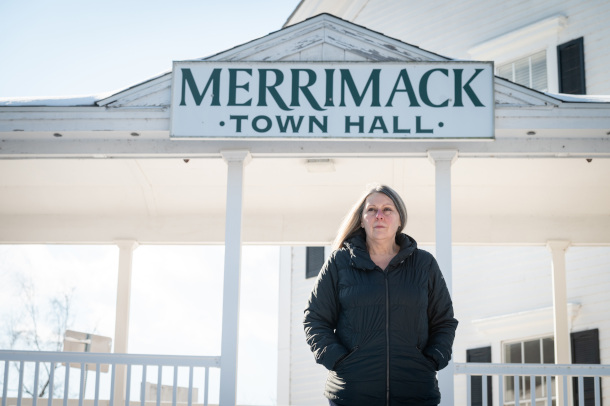
Laurene led a grassroots campaign to address PFAS water contamination in her community of Merrimack, New Hampshire. (Photo: Goldman Environmental Prize)
CURWOOD: So who called this meeting and what was going on there?
ALLEN: The state of New Hampshire, and I saw little bits about the investigation that was really contained. And I think that's how it goes in investigations like this, they look as little as possible, and there was a lot of denial. There was this major effort to keep exposure and outcome really far apart. I kept hearing the phrase, these are emerging contaminants. We've just discovered them. We really don't know much about them. You know, learning since then that, you know, there's an awful lot known about these chemicals. Turns out that they are highly toxic, highly hazardous substances that somehow evaded hazardous substance and toxicity labels for decades. You know, that's infuriating. That's not okay. You know, that's a sense of justice and deception, and all these people who came up to the microphone, nobody validated them.
CURWOOD: So Laurene, you trained as a social worker. I don't imagine you have a whole lot of background in chemistry or environmental studies, or at least before this, but now you are, in fact, one of the nation's experts on PFAS contamination. How did you go about teaching yourself about these chemicals and what motivated you to keep going?
ALLEN: I realized quickly that people in an impacted community such as this are speaking from emotion. They're speaking their truth, they're telling their stories, and they are very emotional and they're very hurt. And that isn't enough to sway the system, is what I quickly realized. And I said, hmm, we need to become our own experts. We need to learn how to talk at a high level, so people realize we know what we're talking about, so we can refute the pat on the back, it's safe. Your exposure is, quote, relatively low. You're not like this other community. You know, we were told these things. The minimization, the denial, it was not acceptable. So we became our own experts. I used an iPad at night, you know. I was never one to take electronics to bed with me. And I'd have something in my mind after work, and about 930 I'd get to it, and I'd start researching and reading investigation documents and reading health studies and reading things from other countries, avidly consuming. There would become a time where I'd look at the clock and I'd say, you really need to go to bed, because in my profession, you need to take care of yourself. You're there for clients the next morning. And, you know, just saying, well, I'll just read one more study. It became, at that point, you know, I thought, what is going on here? It's compulsive behavior. Looking back, I realized at one point, it's a trauma response, you know, it really, really is.
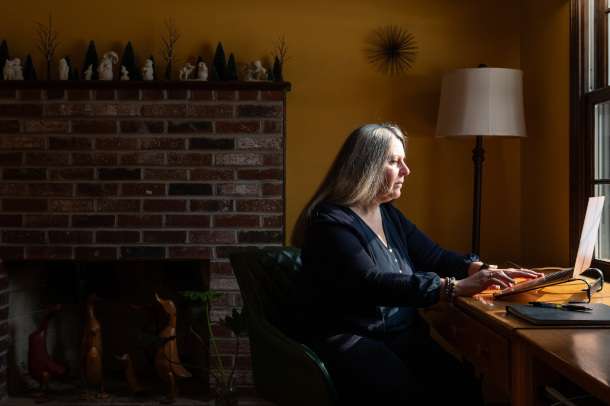
Trained as a social worker, Laurene became a self-taught expert in PFAS chemicals. (Photo: Goldman Environmental Prize)
CURWOOD: So from your studies, what did you learn about the health risks associated with PFAS, or these so-called forever chemicals? What makes them so concerning? To what extent have you seen them in your community there, in and around Merrimack, New Hampshire?
ALLEN: Well, in doing my research, I found out that PFAS are part of the endocrine disruptor category of chemicals, aside from being carcinogens and toxic. So our endocrine system is everything, right? It keeps us healthy. It keeps us in balance. If that's out of whack, we're in trouble. You know, you can find graphics online now that have been created showing the human body, in males and females both and you'll go through every system of the body: the nervous system, the cardiovascular system, reproductive health is highly disrupted, neurodevelopmental changes, autoimmune disruptions, you know, cholesterol impacts, lipids, liver enzymes and kidney impacts. This is a chemical that does not break down, and your body excretes all kinds of things every day. Your body doesn't know what to do with this to break it down, to excrete it. So your elimination organs are very, very impacted, on and on and on it goes. So the research was kind of mind blowing at that point, because I. Was finding study after study showing harm, and I was being told by the folks that are there to guide us that there's no evidence, there's no research, and there's no science. If I can find information on a Google search on a cell phone, and people whose jobs it is that we turn to are saying we just don't know and we don't have any science, not some science and limited, you know, that was a real disconnect there.
CURWOOD: So what if any health effects for you or your family or friends did you become aware of after this?
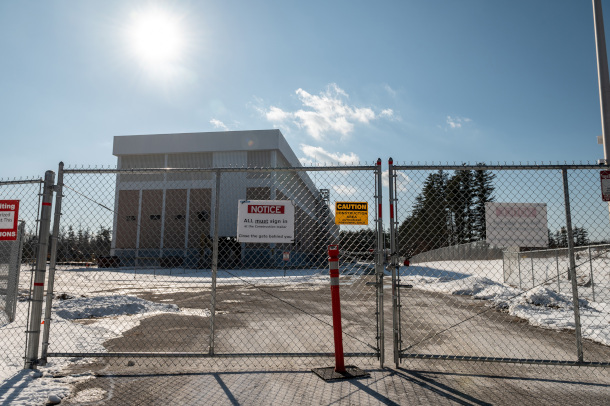
The manufacturing processes of the Saint Gobain Performance Plastics plant were releasing PFAS into Merrimack and surrounding communities for years. The plant announced its plan to close its doors in August 2023 (Photo: Goldman Environmental Prize)
ALLEN: What I saw that meeting initially, was a lot of people with kidney cancer, bladder cancer, breast cancer, which took a number of years to have acknowledged as PFAS related. And I heard about thyroids, thyroids that were disorders, thyroids that had cancerous nodules, thyroids that had been removed in 14 year olds. So that was just the beginning of it. And in 2017 when everybody was telling us, you know, nothing to see here, folks, basically, I decided that we were going to try to collect our health data and bring it to the state. So I went door to door. I found people who were vocal, who I never knew before this journey, and I kind of messaged them all on Facebook Messenger, of all places. And I said, hey, where do you live? Could I come by and bring you some flyers? And would you be willing to give these out with a link to your neighbors? And no one wants to go to door to door in my community, you know, it's very intimidating, and bit by bit, there were people who gradually became part of my citizens group. And we distributed all over town. We put it in a library, in the town hall and in the paper so everybody could come in there and report health issues. So we took it to the state, and of course, we were told this isn't very scientific, and it was as scientifically done in terms of methodology and sampling as a person could do with no budget. But it was really dismissed. At that point we asked them to do a cancer incident report. They did. It was inadequate, and we finally, after two years, got a commitment to redo it. Recently, we have partnered with Dartmouth University to analyze this properly, and they have verified that there's a 62%, you know, statistically significant higher rate of kidney cancer. That's what you're going to see with PFOA, unfortunately.
CURWOOD: So taking on the powerful plastics industry is no easy feat these days. So what did you do to fight back against the Saint Gobain Plastics plant and rally your community to take on this issue of PFAS?
ALLEN: So what I did is it was very clear that what their strategy was is to keep the focus on the past, to say, oh, we really didn't know these problems were there, and we followed the law, and they were omitting what they had transitioned to. So when you phase out, PFOA and PFOS, which industry did, to some extent, by 2015 you change your practices, and you think you can sail off into the sunset, and we're, quote, safe. In fact, you're spewing from 13 unfiltered stacks all of the replacement chemicals for PFOA, which are horrific. So every meeting, over and over and over, I stood up and made sure when they talked about PFOA and PFOS, I would rattle off nine to 12 other ones, and said they are all present. Count them all. You cannot talk about the past only. Now, these formulas that they use are all confidential business information. Nobody's supposed to know what they are. But I did find out what they are. I tracked down that they were made in Chemours in North Carolina, shipped up here and used. I spoke about it freely and openly everywhere I went, and they weren't going to get away with disregarding the elephant in the room, which is the current cocktail of poison.
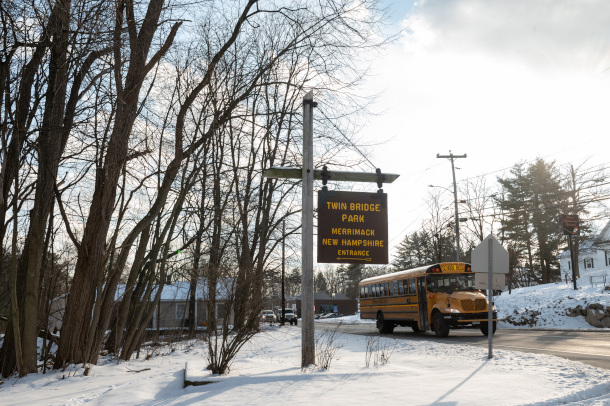
Laurene helped organize community health surveys showing widespread health harms associated with PFAS among Merrimack residents, including kidney cancer, bladder cancer, breast cancer, and thyroid issues. (Photo: Goldman Environmental Prize)
CURWOOD: To what extent did they cast aspersions on your mission, though? I mean, usually people trying to conduct reform get labeled as crazy or out there, or left or right or whatever. What happened to you?
ALLEN: Oh, I was called a fear monger and a crazy lady in the beginning of this, and someone waved his finger in my face, who was in an elected position publicly on camera. The video still exists, I'm sure, and looked at me over his glasses and said, do not use the word, "contamination." It's inflammatory language. And I smoothly said, at that moment, I do not care for that word myself. But like it or not, we are an EPA designated contamination investigation, the biggest investigation in all of New England. I said, I love it here. I moved here for the same reasons as you did. This is horrific. That is not my word. The very next day, the website changed, and they took out the EPA contaminated investigation language, and it said, "investigation into the presence of perfluoral alkali substances," and sanitized it. So, you know, many, many things were said. So another thing I would do is when I saw someone in our town council, or someone that I felt needed better ammunition than they were getting from industry lobbyists, because that's where they were getting information, is having a coffee with them and bringing them documents that I highlighted, and they said, where are you getting this? We get weekly updates. We don't know any of this. And I'd say this is the investigative documents that's stored on the state's website. It's very difficult to delve into it, but I'm giving them to you in a pack and highlighting things that are not okay, even with people who were really terrible to me. You know, when you meet a person and they're really distasteful and they feel harmful to you, you just nod and walk away, and I'm thinking, they don't know, and they need to know, because they're a person, too, and they've been drinking the water. They need to know this. So my compassion, I think, really overrode what was coming at me, and I wasn't personalizing it.
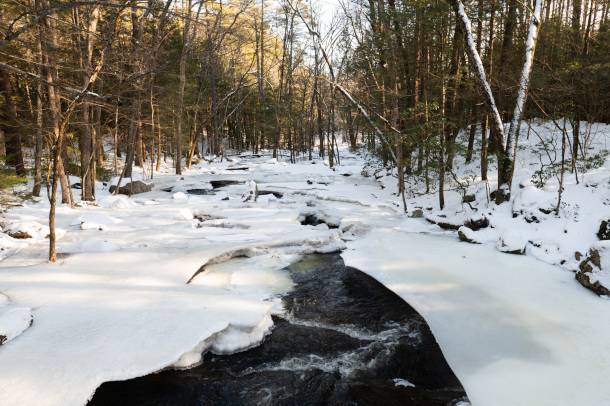
Laurene says more research is needed to document the full scope of environmental and health impacts from PFAS contamination. (Photo: Goldman Environmental Prize)
CURWOOD: Laurene, what were the results of your years-long campaign against the PFAS contamination there in Merrimack, New Hampshire? I mean, today, to what extent has the community been protected?
ALLEN: Well, we haven't been protected, but we've made gains. Basically, we took this really fiscally frugal state, and we convinced the residents that there was enough of a problem that 93% of taxpayers voted to remediate all of our public wells at our own cost, with the hopes that we would get justice and be reimbursed for that at some point. That is unheard of, 93% vote, and that is how well educated people have been and how they concluded that the water was not safe. We've established a grant program for all of New Hampshire, just not Merrimack, under some Biden infrastructure dollars that were specifically earmarked to PFAS, first in the nation, all private well owners whose well tests above 12 parts per trillion of PFOA, which is now four parts, will receive a $5,000 grant to filter, properly filter, their wells. So that was huge. We have successfully got air permitting when it comes to PFOA in rule making. So Saint Gobain needed to filter their air stacks. You know, what we have accomplished is more in the regulatory which is huge for New Hampshire.
CURWOOD: And what's happened to the company, Saint Gobain?
ALLEN: Saint Gobain, shortly after being approved for their air permit for the next five years, really surprised people when they announced that they were going to reorganize and close this facility. I know that they realized that we weren't ever going to stop, we aren't ever going to go away. They had been banking on hiding in New Hampshire and no eyes upon them.
CURWOOD: So Saint Gobain has gone away, they left Merrimack. But what's left behind? Usually, these kind of chemical manufacturers leave a fair amount of residue. What's been done to take away any further toxic danger?
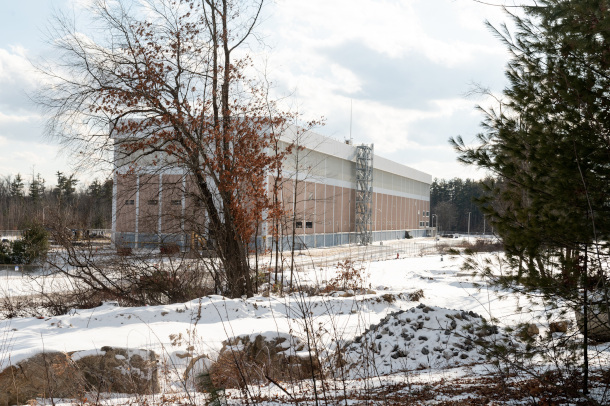
While the Saint Gobain plant shut down its operations in Merrimack in May of 2024, Laurene claims its cleanup efforts do not adequately address contamination. (Photo: Goldman Environmental Prize)
ALLEN: A highly, highly contaminated site that just recently was acknowledged by the state of New Hampshire as having an inadequate remediation plan that took two years for them to say those words. We haven't succeeded in really protecting the environment because the site cleanup plan is that's being proposed as a joke. It does nothing. The soil, the groundwater, the river, the fish, the livestock, that's never been looked at. So they'll leave behind a forever impact on the community, right? The forever chemical that never goes away.
CURWOOD: Laurene, before you go, what gives you hope?
ALLEN: What gives me hope is the people. You know, the people who are so remarkable that they've stepped up and they've stood shoulder to shoulder, and we have propped each other up. And it's real easy to be fearful and to hide and say, I can't deal with this, but people give me hope. I believe in people, regular people, can do amazing things when they work smart and they work together.
CURWOOD: Laurene Allen is the 2025 Goldman Prize winner for North America. Laurene, congratulations and thanks for taking the time with us.
ALLEN: Thank you so much.
Related links:
- The Goldman Environmental Prize | “Laurene Allen”
- Sierra Club | “PFAS (Perfluoroalkyl and Polyfluoroalkyl Substances)”
- Follow Laurene Allen on Bluesky
- Follow Laurene Allen on X
- Learn more about Merrimack Citizens for Clean Water
- Learn more about the National PFAS Contamination Coalition
[MUSIC: Andrew Gialanella, “Barefoot” Single, Andrew Gialanella]
CURWOOD: Living on Earth is produced by the World Media Foundation. Our crew includes Naomi Arenberg, Jenni Doering, Daniela Faria, Mehek Gagneja, Swayam Gagneja, Mark Kausch, Mark Seth Lender, Don Lyman, Ashanti McLean, Nana Mohammed, Aynsley O’Neill, Sophia Pandelidis, Frankie Pelletier, Jake Rego, Andrew Skerritt, Melba Torres, and El Wilson.
BELTRAN: Tom Tiger engineered our show. Alison Lirish Dean composed our themes. You can hear us anytime at L-O-E dot org and send us your feedback at comments at loe.org. I’m Paloma Beltran
CURWOOD: And I’m Steve Curwood. Thanks for listening!
ANNOUNCER: Funding for Living on Earth comes from you, our listeners, and from the University of Massachusetts, Boston, in association with its School for the Environment, developing the next generation of environmental leaders. And from the Grantham Foundation for the protection of the environment, supporting strategic communications and collaboration in solving the world’s most pressing environmental problems.
ANNOUNCER 2: PRX.
Living on Earth wants to hear from you!
Living on Earth
62 Calef Highway, Suite 212
Lee, NH 03861
Telephone: 617-287-4121
E-mail: comments@loe.org
Newsletter [Click here]
Donate to Living on Earth!
Living on Earth is an independent media program and relies entirely on contributions from listeners and institutions supporting public service. Please donate now to preserve an independent environmental voice.
NewsletterLiving on Earth offers a weekly delivery of the show's rundown to your mailbox. Sign up for our newsletter today!
 Sailors For The Sea: Be the change you want to sea.
Sailors For The Sea: Be the change you want to sea.
 The Grantham Foundation for the Protection of the Environment: Committed to protecting and improving the health of the global environment.
The Grantham Foundation for the Protection of the Environment: Committed to protecting and improving the health of the global environment.
 Contribute to Living on Earth and receive, as our gift to you, an archival print of one of Mark Seth Lender's extraordinary wildlife photographs. Follow the link to see Mark's current collection of photographs.
Contribute to Living on Earth and receive, as our gift to you, an archival print of one of Mark Seth Lender's extraordinary wildlife photographs. Follow the link to see Mark's current collection of photographs.
 Buy a signed copy of Mark Seth Lender's book Smeagull the Seagull & support Living on Earth
Buy a signed copy of Mark Seth Lender's book Smeagull the Seagull & support Living on Earth

